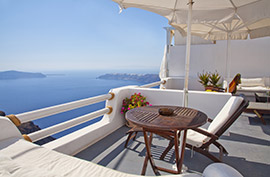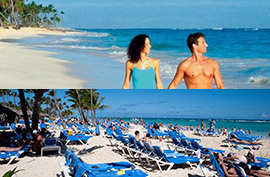 Ever been hoodwinked by a hotel? Maybe you booked a stay on the strength of its beautiful website, showing photos of sumptuous rooms and promising a location within walking distance of a major museum -- only to arrive and realize that your digs were the size of a closet and "walking distance" was a 25-block schlep.
Ever been hoodwinked by a hotel? Maybe you booked a stay on the strength of its beautiful website, showing photos of sumptuous rooms and promising a location within walking distance of a major museum -- only to arrive and realize that your digs were the size of a closet and "walking distance" was a 25-block schlep.
To be fair, most hotels don't tell outright lies; instead, they use purposely vague phrasing, lies of omission, "marketing speak" and clever camera angles that lead you to believe their properties are offering more than they actually are. Buyer beware! Below are six common ways that hotels often mislead potential guests.
In a quick IndependentTraveler.com staff poll, nothing drew more ire than hotels misleading us on the quality of their breakfast. Sure, it's great when the most important meal of the day is included for free, but that's not saying much when the offering is nothing more than stale coffee, a couple of Lipton tea bags and a piddly selection of prewrapped Danishes. When we see the words "continental breakfast," we're not expecting omelets and fluffy pancakes -- but can't we at least get a few pieces of fresh fruit and some yogurt? Is a cup of orange juice so much to ask?
Even worse are the homey little inns that bill themselves as "bed and breakfasts" but charge you extra for the breakfast part. (One example: the Harlem Grand B&B in New York, which offers breakfast vouchers for purchase at $12 a pop.) Talk about false advertising.
 11 Things Not to Do When Booking a Hotel
11 Things Not to Do When Booking a Hotel
We've lost track of the number of times we've seen a hotel claim to be "just steps from" the beach or the most popular attraction in town. The problem is that such vague wording can mean nearly anything. Maybe you'll step outside your door and find yourself right on the sand -- or maybe you'll have to lug your beach towel and chair three quarters of a mile, crossing half a dozen busy streets in the process.
Even less ambiguous phrasing such as "a 15-minute walk" is worth double-checking, because not all of us walk at the same speed. A quick look at Google Maps or another mapping tool can give you the exact distance between your hotel and the attraction you're interested in, as well as show you any highways or other obstacles that might be lurking in between.
 Is there anything sweeter than watching the sun set over the sea from the balcony of your hotel room? Don't necessarily count on this experience if you're booking an oceanview room.
Is there anything sweeter than watching the sun set over the sea from the balcony of your hotel room? Don't necessarily count on this experience if you're booking an oceanview room.
At many properties there's an important difference between an oceanview and an oceanfront room. While an oceanfront room will look out directly on the water, an oceanview room is only guaranteed to give you a glimpse of the sea -- and you may need to crane your head just the right way to see a patch of blue between buildings or landscaping elements.
Keep in mind also that an oceanview room might give you a beautiful panorama over the sea but from a distance (such as high on a hill) -- so if you want to swim in that ocean at any point, you might not be as close as you'd like to be.
 Hotel Room Views: Do They Really Matter?
Hotel Room Views: Do They Really Matter?
Many hotels offer free Wi-Fi, which you'd think would be a good thing; after all, it's the amenity travelers want most. Unfortunately, that doesn't mean the free Wi-Fi is actually functional.
At some properties, the connection is so slow it's nearly impossible to load a page in the evening when everyone's trying to get online at the same time. At others, Wi-Fi might only be available in public areas -- but who wants to traipse down to the lobby every time you want to check your email?
The latest trend, according to USA Today, is hotels offering free Wi-Fi to all guests but charging a premium for higher speeds. So we have to pay extra if we don't want to wait 60 seconds for each page? Thanks a lot.
Ahhh. Gotta love the feeling of settling in at an all-inclusive resort, knowing that you're paying one reasonable price for a wealth of free, awesome amenities. But wait: What's that extra $30/night charge on your bill?
That would be the resort fee, an ever-more-popular way for hotels to charge you for all those extras you thought you were getting for free -- think Wi-Fi, welcome cocktails and use of the pool -- without having to raise their base rates. We consider resort fees a lie of omission, as they're often not revealed until you've selected your hotel and gone through a couple of booking screens. But they can make a significant difference to your bottom line. The St. Regis Bahia Beach in Puerto Rico, for example, charges a $60 resort fee per night, while the Ritz-Carlton in Grand Cayman tacks on a whopping $70 extra charge (as well as a daily "10 percent service charge"). Yowza.
 Beware of These Hidden Hotel Fees
Beware of These Hidden Hotel Fees
Sometimes hotels mislead not only with words, but also with photos. They might shoot a small guestroom with a fisheye lens to make it look larger, or use mirrors and clever angles to turn a cramped basement gym into what appears to be a sprawling fitness center. And of course, the pool is never as empty and pristine in real life as it is in the hotel's online gallery. (Where did they hide the 20 screaming kids that are normally there?)
 Our sister site, Oyster.com, has created a fun Photo Fakeout series that puts glossy pictures from a hotel's website next to Oyster's own more honest shots. Here the truth is revealed: supposedly deserted beaches are actually packed elbow to elbow with sun loungers, while luxurious-looking pools are right next to a Macy's department store or exposed as not much larger than a hot tub.
Our sister site, Oyster.com, has created a fun Photo Fakeout series that puts glossy pictures from a hotel's website next to Oyster's own more honest shots. Here the truth is revealed: supposedly deserted beaches are actually packed elbow to elbow with sun loungers, while luxurious-looking pools are right next to a Macy's department store or exposed as not much larger than a hot tub.
If the hotel you're considering hasn't been given the Oyster fakeout treatment, you can still look for truth in advertising by checking out user-submitted photos on TripAdvisor. While the quality of the photos varies -- expect a few dark and blurry shots mixed into the gallery -- these undoctored images will give you a much more realistic vision of what a hotel's rooms and public spaces look like.